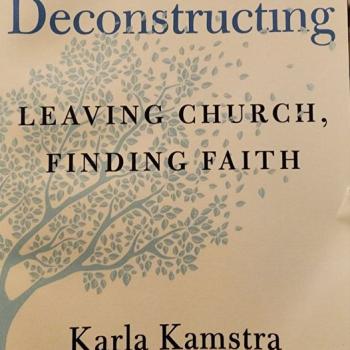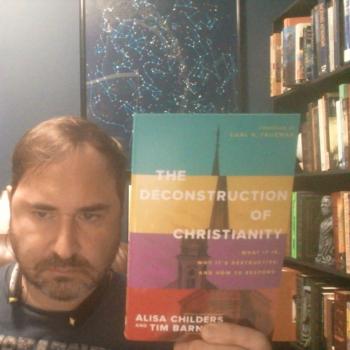
The Ads
An ad pops up on your social media. It features a woman sitting in a pew, alone in an empty church. She says “Frozen by fear of rejection by God, my family, my community, I banished my inner voice, distrusting myself and all my feelings.”
The ad gives a link to learn more about something called “Religious Trauma Syndrome.”
Another ad from the same source shows a weary man on the ground looking into a cracked mirror. It says, “I went through five mental health professionals before finally finding one who was educated on the causes, manifestations and treatment options for Religious Trauma.”
A third ad shows a woman’s face emerging from spider webs as she says, “My world. Spinning out of control. Again. On the verge of another emotional breakdown. Sinking deeper and deeper into the oppressive thought patterns and behaviors that left me lost in the inner void of despair that had become all too familiar.”
Notice the imagery and the text. The distress in these ads is palpable.
I will dive more deeply into Religious Trauma Syndrome in a bit, but suffice it to say that this is defined as a sense of lingering trauma, as a type of Post Traumatic Stress Disorder, that a person has based on religious experiences in the past. The sort of thing for which one would require counseling or professional help in order to cope.
The Grift
If one were to click on any of these ads, one would be met with a page that begins by defining Religious Trauma Syndrome. Multiple times. It shows how researched it is, and invites you to learn more about it. It lists symptoms which probably look familiar.
And for a mere fifty dollars, you can watch lots of videos about it, read lots of articles about it, and… although the page does not say anything about this directly, perhaps behind the pay wall you will find resources for therapy and/or recovery. I have not paid to find out.
Notice the way this works. The ad gives some vaguely distressing imagery about how religion may have caused you emotional distress. You click on the ad and scroll through lists of symptoms and discussion of this phenomenon. By the time you get to the bottom, and you are thoroughly convinced you have the disease in question, they offer to sell you a package which may or may not include the help you need.
The Organization Behind the Ads
Welcome to the Global Center for Religious Research. As a global research center, you might expect them to have more on their site than just Religious Trauma material, and you’d be right. It composes only about half of the website.
Now a cynic might say that this is a group looking to make a profit off of people with mental health problems. But running lots of ads costs money, and maybe they really are a compassionate group trying to help people in distress, and the $50 is just compensation for the important work of getting the word out.
Further investigation will bring you to the “About” page, where it says “GCRR is adamantly not profit-driven or agenda-driven. We are education-driven. Both our motivation and passion is focused on knowledge. As such, GCRR is neither religious nor confessional in its pursuit of that knowledge, and we do not promote or endorse any specific religion, political body, or (anti-)religious agenda.”
Not only are they not profit driven or agenda driven, but adamantly so.
Here are a few of the services they offer:
This global center for religious research offers a total of four educational courses. The least expensive of which is $50. They include two Jewish study courses, a course titled “Does God Exist,” and the money maker: “Religious Trauma Syndrome” for a mere $250.
But perhaps this is the ordinary cost of online education.
A quick peek at similar courses on another online educational platform, Udemy, shows that such courses could be had for an average of $30.
But perhaps the quality of education the GCRR is offering is so much better that it justifies those high costs.
Another service offered by this organization is their quarterly research journal. For an average of $1.99 you could read any of their research articles. And you would have to if you wanted to fact check their material on Religious Trauma Syndrome, because the only research cited in these studies comes from their in-house publication. But $1.99 for an article is actually very affordable compared to most scholarly research journals. However if the article happens to be on Religious Trauma Syndrome, it may cost ten times that price.
One could subscribe to the quarterly publication for around $40, and have access to all of the research for that one quarterly price.
Charging money for subscriptions to research journals is common practice, and there is nothing suspicious about that. Fortunately, if you are associated with a university, as I am, your university library subscribes to these journals and can give you access behind the pay wall.
But when I use my university to search for any of their articles, the articles don’t show up in the search, much less give me paid access. This is very unusual, because the university cannot subscribe to every journal in the wide world of academic research, but it should at least return any article from a reputable source in the results.
Another option I have on the GCRR website is to join their academic society, which also costs money.
The adamite assertion in their about page which suggests that they are not profit driven is beginning to look a little shaky at this point. You have to pay for their resource packages, for membership, to access their research, and much higher than normal to take their online courses. And until recently, the page even had a merchandise store, suggesting that this research and education organization briefly sold mugs and t-shirts.
But what about their adamite assertion that they are not agenda driven?
Agendas
Well one thing on the website you don’t have to pay for is the blog.
At the time of writing, the first article on the blog is on the topic of police corruption, and its titled “My Brother is a Cop, and it’s not just a few bad Apples.” This seems like a political talking point, and not anything to do with religious research.
But perhaps the most interesting blog title is: “Why does the GCRR hate religion so much?”
Apparently, some people have come under the impression that this organization which adamantly claims does not endorse an anti-religious agenda and is not agenda driven still hates religion. But the article addresses this. It is sub-titled “We don’t, we just enjoy making fun of them.”
They don’t hate religion. This nonpartisan, non-agenda-driven organization just likes making fun of religion.
Something seems amiss here. This organization is clearly spending a significant amount of money slathering the internet with ads aimed at those who feel emotional trauma from their religious experience.
If a person happens to click on the ad, they are sent to a page which serves them a laundry list of symptoms which could be attributed to this mental illness. Then charges them for material which may or may not include therapeutic resources. Also, it would cost them over $200 to take the certification course on the subject, not to mention purchasing a membership, and purchasing the research in order to check their methods.
Unsurprisingly, this organization which apparently relies on a base of paying customers who feel abused by religion enjoys making fun of religion, even as they pose as an academic education and research organization.
It’s time to leave the website and do a little investigation on the side.
Outside Investigation of the GCRR
My first stop was the Better Business Bureau, but the BBB had never heard of the Global Center for Religious Research.
I did find them on Open Corporate, another site cataloging businesses. According to Open Corporate, they are an LLC – so definitely a for-profit organization. But we already knew that by now.
The company was established during the lockdown of 2020, which isn’t particularly surprising.
Next, I did what any internet investigator does in order to dig up information, and I took to Reddit. My first attempt at gathering information received two comments before being downvoted into oblivion.
My next post, which was later removed for unspecified reasons, did get me a result, however.
I discovered a source who knew a few things about the GCRR. Seems the group was the brainchild of a few activists who connected with one another through secular conferences. This should be no surprise since a glance at their homepage shows that they organize atheist conferences.
Call me cynical, but it seems to me like a conflict of interest for an organization run by atheist activists to be providing resources on religious trauma syndrome.
Now you may think the only alternative would be religious people offering these resources, but the world is not divided into just religious people or atheists. There is a third choice: the field is full of therapists and psychologists who have no ideological commitment for or against religion.
There is a difference between an atheist and an atheist activist. One simply holds a particular position related to religion, the other is interested in changing the religious landscape.
This does not appear to be a serious academic society. The research they do seems suspect, meaning if I paid the exorbitant cost for one of their certification courses, it would be a waste of my money, as the certification, and likely the information I received would be worthless.
Religious Trauma Syndrome
Now let’s talk about their hobby horse: religious trauma syndrome.
RTS was brought into public discourse in the 1990s by way of a self-help book titled Leaving the Fold. The book was written by a counselor, not a psychologist. At least not at the time. She has since gained her PhD, and has become something of a celebrity in the field as a “religious recovery consultant.” At the time she wrote the book, she had done no academic work on the subject, relying on her own personal experience and anecdotes she received from her patients. A cursory glance through the scholarly literature shows no peer reviewed publications by her since the authorship of that book.
Very little attention was given to her work at the time, and her work as well as the term she coined has only come into vogue now, 30 years later. It is not coincidental that Religious Trauma Syndrome should have come into the lexicon of pop psychology at the same time as the “Deconstruction Movement” arose.
With legions of people very publicly and vocally exiting religion, rediscovering self-help writing on the trauma that comes with religious exit is to be expected. However, when I use my university search tool to discover the literature on the subject, there is exactly one return: a qualitative study which discusses the vernacular surrounding Religious Trauma Syndrome.
What About the GCRR?
By all appearances, the GCRR is an opportunistic organization which attracts people who have left their religion, provides lists of mental health problems associated with religion, priming the candidate, and then offering them a variety of (likely unhelpful) resources for exorbitant fees.
Out of charity, I will allow that publication of books is expensive, and journals are extraordinarily expensive to publish given that one has to pay the researcher for the article and frequently for the research. It is expensive to create courses, host conferences, to run a YouTube channel, to run an ad campaign, and the many other things this company appears to do. Perhaps the GCRR is a fledgling company, despite their three years of operation, and will someday bloom into a respected locus of academic research, and I will be able to find their material through my university. My inside source was skeptical that they would ever become a serious research organization, but given the anonymous nature of Reddit, I have no way of verifying him to whom I spoke.
I am also assuming the research is poor without looking at the methods in these papers, because I do not wish to pay to read them. And I am assuming that the material they create on RTS is poor without seeing it, because I do not wish to pay to see it.
I may be wrong about the GCRR, but I remain cautiously skeptical, and recommend the same from my readers until further information becomes available.














